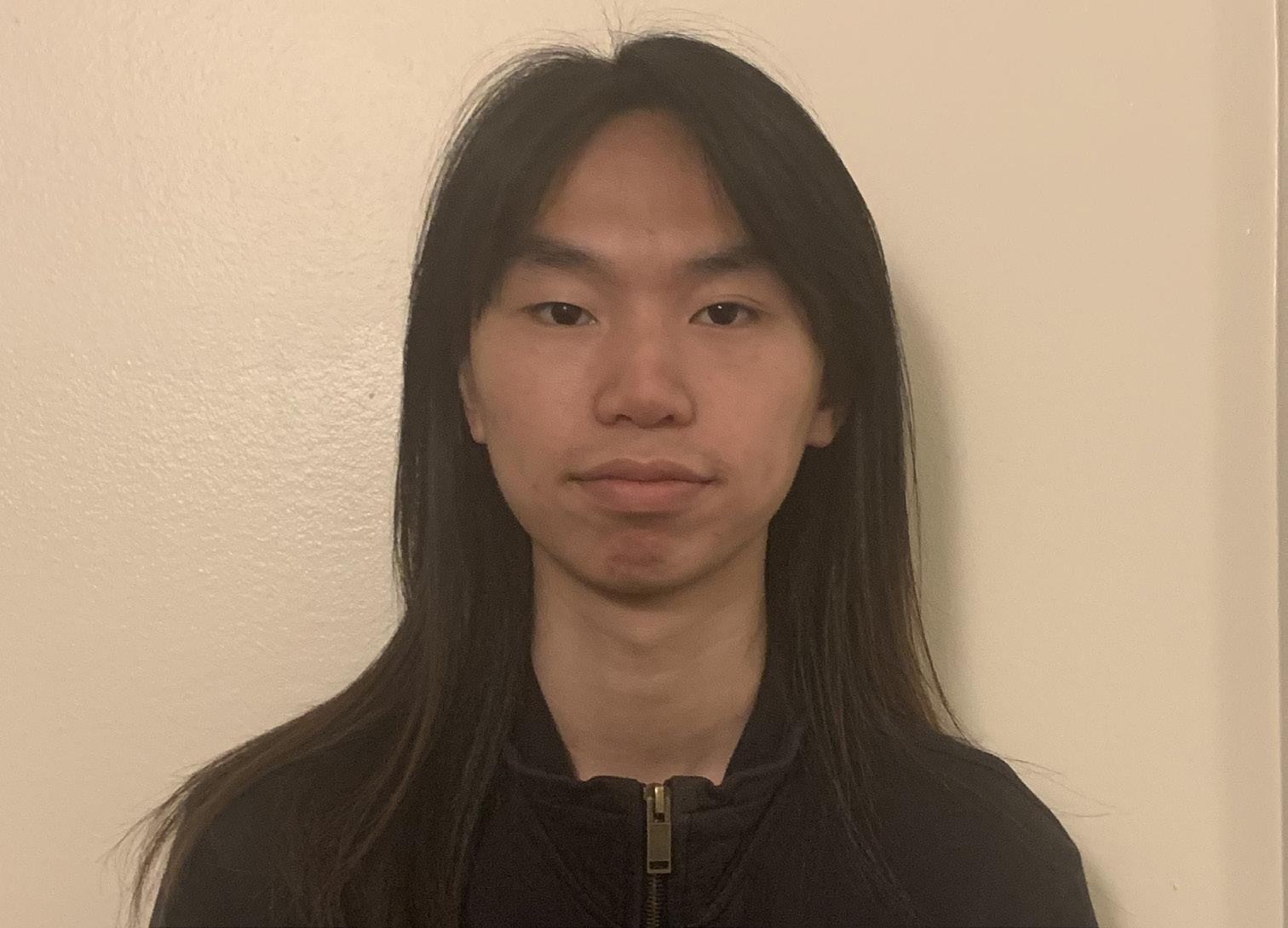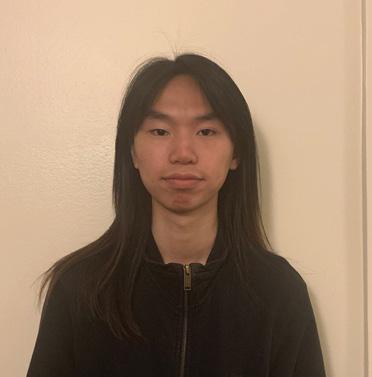

Sunday, November 20, 2022 7:30 pm Conservatory Recital Hall
39TH PERFORMANCE OF 2022-23 ACADEMIC YEAR
SENIOR
PIANO RECITAL Matthew Hui
Lord . . . Hold My Hand (2006) Yiruma (b. 1978)
Nostalgia (1998) Joe Hisaichi (b. 1974)
Blue Moon Shadow 藍月流影 (2019) VK 克 (b. 1982)
The Fetter 結 (2019) VK 克 (b. 1982)

Reminiscent (2011) Yiruma (b. 1978)
This Capstone Project recital is presented as a degree requirement towards a Bachelor of Arts degree in music.
Matthew Hui is an international student from Hong Kong. He is senior music major at the University of the Pacific studying piano with Natsuki Fukasawa. Matthew is considering either going to Canada or back to Hong Kong for further studies in music and may apply for graduate school for a master's degree. He plans to become a music teacher or accompanist in the future.
music.pacific.edu
PROGRAM I NOVEMBER 20, 2022 I 2:30 PM
PROGRAM NOTES
Hold My Hand is a piece composed by Korean pianist and composer Yiruma, included his fifth album H.I.S. Monologue - One Day Diary . . . 19th September. As a Christian, Yiruma always prays to God whenever he is struggling in life. Yiruma hoped to put a spiritual tinge on his music. He also wanted to express through music a message of the Lord’s monologue. This piece, therefore, can be considered Yiruma’s own Gospel composition. The melody of this piece is simple and repetitive without too many moving lines. One thing to look for in this piece is the exquisite detail of his writing, such as the grace notes in the melody which make the melody sound more sentimental and, in this case, helpless. Even though this piece doesn’t have a lot of notes and it is not difficult to play, it contains a lot of underlying emotion.
Lord . . .
Yiruma is the stage name of South Korean piano music composer Lee Ru Ma. The name “Yiruma” means “I shall achieve” in Korean. Born February 15, 1978, he started to learn the piano at home at the age of five. When he moved to England, he attended the Purcell School for Young Musicians and King’s College, where he earned his composition degree in June 2000. During his time in college, he participated in a musical tour in Europe. Making a historical impact for his country, Yiruma was the first Korean artist to receive an invitation to perform at the 2002 MIDEM in Cannes, France. In 2011 Yiruma released his compilation album The Best: Reminiscent, 10th Anniversary with Sony Music and successfully toured with The Best concert to thirteen Korean cities. Official videos for The Best album, including his most famous pieces Kiss the Rain, Maybe, and River Flows in You, hit over 100 million views on YouTube. Yiruma’s seventh album, Stay in Memory, was recorded in a concert hall for the vividness of playing by two Korean “best engineers”—Lee Jae Hoon and the first Korean Grammy Award winner of Best Engineer, Hwang Byeong Joon. Yiruma’s worldwide achievements include his successful 2013 Australian promotion tour, highlighted by his showcase at the Sydney Opera House, and, in 2014, passing gold and reaching the platinum award in physical album sales in Malaysia. Yiruma’s musical style is sometimes classified vaguely as "popular", as shown by the inclusion of his hit piece River Flows in You on a compilation of wedding pieces. Unlike traditional piano solo pieces, Yiruma's pieces are also heavy in simple melody and rhythm, making them immediately attractive to many modern ears.
Nostalgia, by Japanese film composer Joe Hisaishi is the piece on his album Piano Stories III. It is the third his Piano Stories’ collection, which contains tracks from many of his successes in the Japanese film industry through his collaboration with Hayao Miyazaki. Compared to other Piano Stories albums, this particular album has less film music, whereas it has more original compositions such as Nostalgia. This album is very personal to Hisaishi as he is not writing for others but for himself. Unlike other film pieces which express character’s emotion, Nostalgia expresses
PROGRAM NOTES
Hisaishi’s personal feeling and emotion to the audience as if they are having a connection with Joe Hisaishi himself. The piece talks about the loneliness of being away from home. When one is far away from home, the nostalgic emotion is the only way people can connect to their home. The nostalgic feeling allows people who are wandering or struggling outside to look back so that they will have the courage to move on. The piece starts with two arpeggiated chords in two different octaves which create a very dreamy and sentimental atmosphere. In the middle of the piece, the meter changes to 3/4. It is expected to sound more dancelike with positive energy, but rather it is more sentimental as it is accompanied by the nocturne-like left hand. Perhaps because people always pursue happiness, sadness sometimes is even more unforgettable. At the end, the two arpeggiated chords return to wake people up from this dreamy nostalgic feeling and move on in real life.
Mamoru Fujisawa also known as Joe Hisaishi was born in Nakano, Japan. (Hisaishi formulated an alias inspired by American musician and composer Quincy Jones: “Quincy,” pronounced “Kuinshī” in Japanese, can be written using the same kanji in “Hisaishi,” and “Joe” came from “Jones.”) He is most celebrated for his alternately touching and dynamic orchestral film scoring. He developed his music from minimalist ideas and expanded toward orchestral work. He is a prolific composer of classical works, film scores, piano music, experimental electronic and animation music who is best known for his collaborations with Studio Ghibli animation director Hayao Miyazaki. Highlights of his collaborations with Miyazaki include animation scores for 1988’s My Neighbor Totoro, 1997’s Princess Mononoke, 2001 Oscar winner for Best Animated Feature for Spirited Away, 2004’s Howl’s Moving Castle, and 2013’s The Wind Rises and The Tale of the Princess Kaguya. His music One’s Summer Day from Spirited Away and Merry Go Round from Howl’s Moving Castle got thirty-one million and thirty-six million streams, respectively, on Spotify as of 2022. Hisaishi has won numerous awards, including seven Japanese Academy Awards for Best Music, the Los Angeles Film Critics Association Award Music Prize for Howl’s Moving Castle, and the International Film Music Critics Association Award for Television Division Best Original Score Award, among many others.
Blue Moon Shadow 藍月流影, composed by modern Taiwanese composer VK 克, is one of the songs on the album Endless Falling Light, which is “dedicated to every note connected to the planet.” The piece describes that when the moon shines a charming blue light, it means the particles in the air have been transformed. In the beginning, the low frequency is like the loud noises of an earthquake that pierce the quietness of the sky. The rhythm of the compound beat and the interlacing of multiple duple figures in the orchestra make the whole piece appear vast and progressive, like a whirlpool or like an illusion of the halo effect of the moon that makes you feel dreamy. The gradation halo of the blue moon is the formation of
PROGRAM NOTES
a dream, a gate across the dimension of time and space, and it may also be a silent starry path that can take people into the beyond. The piano opening with a Dorian scale brings in a line that seems to be a bright and stable path. But step by step, more and more passionate feelings rush in like waves with the help of the snare drum, allowing the listener to gradually walk into that door and enter into different dimensions of emotion. The reason I choose this piece is because I especially want to let Western people know who VK 克 is and share the East Asia culture through his music. Furthermore, I want to share an epic film score–like piano piece to the Conservatory, and let people know that modern piano music can also be really cool and stylish.
The Fetter, also by VK 克 from the same album, features a fusion between traditional Chinese music and modern piano pop music. The title The Fetter is inspired by Sanskrit samyojana in Buddhism. Samyojana is a mental fetter that refers to the potential troubles in a person’s inner consciousness, which can create obstacles, bind a person in samsāra (cycle of death and rebirth), prevent a person from being liberated, and bring suffering. Cut off the bond and one can enter Nirvana, which is to be released from the cycle of suffering and rebirth in samsāra. This piece is composed in the Chinese heptatonic scale. It is a piano piece featuring two traditional Chinese instruments—sheng and erhu—and strings. The sheng is a Chinese mouth-blown polyphonic free reed instrument consisting of vertical pipes, usually used to accompany solo instruments. The erhu, known in the Western world as the Chinese violin, is a Chinese two-stringed bowed musical instrument used as a solo instrument. The erhu’s special timbre/frequencies and wide dynamic range, combined with the sheng’s sound of loneliness, has the effect of telling a story with the melody yet hiding some ineffable feelings between the notes. Furthermore, the embellishments of the lo-fi beat and synth help enhance the rhythmic idea throughout the piece. The usage of traditional Chinese instruments and modern Western accompaniment makes an illusion that we are traveling through time and space.
VK 克 is an iconic Asian pop pianist and composer from Taiwan. VK never confines his music to specific styles or genres. In addition to his own studio albums, he makes music for multiple video games, advertisements, television, and films. Over the years, he has composed some of the greatest hit songs and become one of the most popular crossover artists in Taiwan. He composed the ending song “手掌心” (Palming Love) sung by Della Ding, which won Best TV Soundtrack Single of the Year along with many other awards. He also performed in the music video, which has gained over 110 million views on YouTube. In the same year, he released his third studio album 第三樂章 (The 3rd Movement), the first album in Taiwan to include works from different films and video games. He also scored “延 續自己的聲音篇”from the 裝滿的生活時光 series on Hakka TV, which won the
PROGRAM NOTES
48th Golden Bell Awards for Best Advertising Campaign. VK’s music is innovative, inspiring, and beyond genre. Aside from writing the solo piano pieces, he’s also good at using a single instrument to play the melody, string instruments to support the harmony, or sometimes even an entire orchestra for an epic style. By creating the virtuosic “VK-ish piano rap style” beloved by numerous teenage fans, he has surely redefined how piano was played. VK has a unique musical style that moves the audience and touches their hearts without language.
Reminiscent is a piece that Yiruma composed as part of his ten-year anniversary for the album Reminiscent 10th Anniversary. The piece has an entrancing melody with repeated arpeggio over 6/8 time. In the middle of the piece, the meter changes to 4/4, which leaves a notable impression as it changes from constantly flowing motion to a steady and calm oasis. Yiruma wrote Reminiscent to express continuousness: life continues, music continues and will never stop, everything continues. Yiruma keeps using the same melody and chord progression again and again to enhance the continuous and the never-ending atmosphere of the piece. He encourages his listeners to “remember all the times when you are happy and sad while listening to this song. I hope that I can exist within your memories with this piece.”
notes by Matthew Hui
Program



